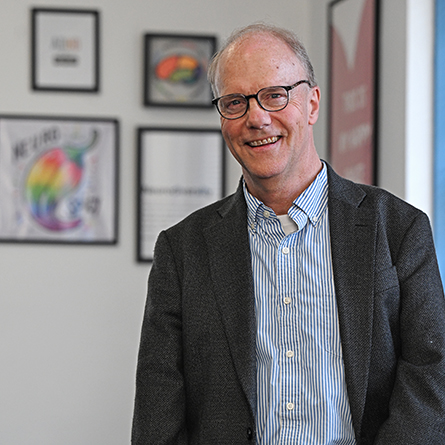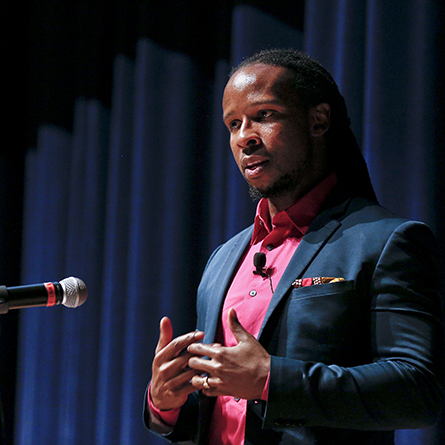
How to be antiracist: Ibram X. Kendi joins Conversations on Race
When bestselling author Ibram X. Kendi was in high school, he thought he was “woke.”
Kendi, the director of the Antiracist Research and Policy Center at American University, recalled giving a speech on Dr. Martin Luther King Jr. Day, in which he discussed “all the things that were wrong with black people.” He said it took time to realize the ideas he was expressing back then were, in fact, racist.
“The heartbeat of racism is denial, and the heartbeat of antiracism is confession,” Kendi told the audience of more than 1,000 members of the Connecticut College, U.S. Coast Guard and greater New London communities who gathered Feb. 12 in the Coast Guard Academy’s Leamy Hall.
Kendi, the youngest ever winner of the National Book Award for Nonfiction for his acclaimed book, Stamped from the Beginning: The Definitive History of Racist Ideas in America, was invited to speak about his latest work, the New York Times bestseller How to Be an Antiracist. The talk was part of Conversations on Race, a collaborative series of community discussions hosted by Connecticut College and The Day newspaper and in partnership with the U.S. Coast Guard Academy.
Throughout his hour-long speech, Kendi used humor and lively anecdotes to discuss and define both racism and antiracism. A racist idea, he said, is an idea that suggests a racial group is superior or inferior to another group in any way, while an antiracist idea is one that suggests all racial groups are equal.
As an example, Kendi pointed out that 40 percent of America’s incarcerated people are black, even though black people represent just 13 percent of the country’s general population.
“What is the problem, is it bad people or is it bad policy? I'm arguing that whenever we make the case that the cause of inequity is bad people, we're making a racist case. Whenever we make the case that the cause of inequity is bad policy, we're making an antiracist case,” he said.
Kendi also answered questions from the audience in a Q&A moderated by Connecticut College’s Dean of Institutional Equity and Inclusion John McKnight and representatives from the Coast Guard. President Katherine Bergeron gave the introduction, Conn’s Race and Ethnicity Programs ambassador Mariel Ozoria ’20 gave a welcome, and Director of Religious and Spiritual Programs Angela Nzegwu gave a call to community.
Previously, the College hosted Richard A. Robinson, chief justice of the Connecticut Supreme Court, as part of the Conversations on Race series. The College will next welcome Khalil Gibran Muhammad, professor of history, race and public policy at Harvard Kennedy School and the Suzanne Young Murray Professor at the Radcliffe Institute for Advanced Studies, at 4:15 p.m. on Feb. 24 in the Charles Chu Asian Art Reading Room in Shain Library. Muhammad, who wrote an essay for The 1619 Project about the history and legacy of sugar plantations, will give a talk about looking back at the year 1619, as well as the present and future of criminal justice reform in America.
Read more about Kendi’s talk in The Day.








